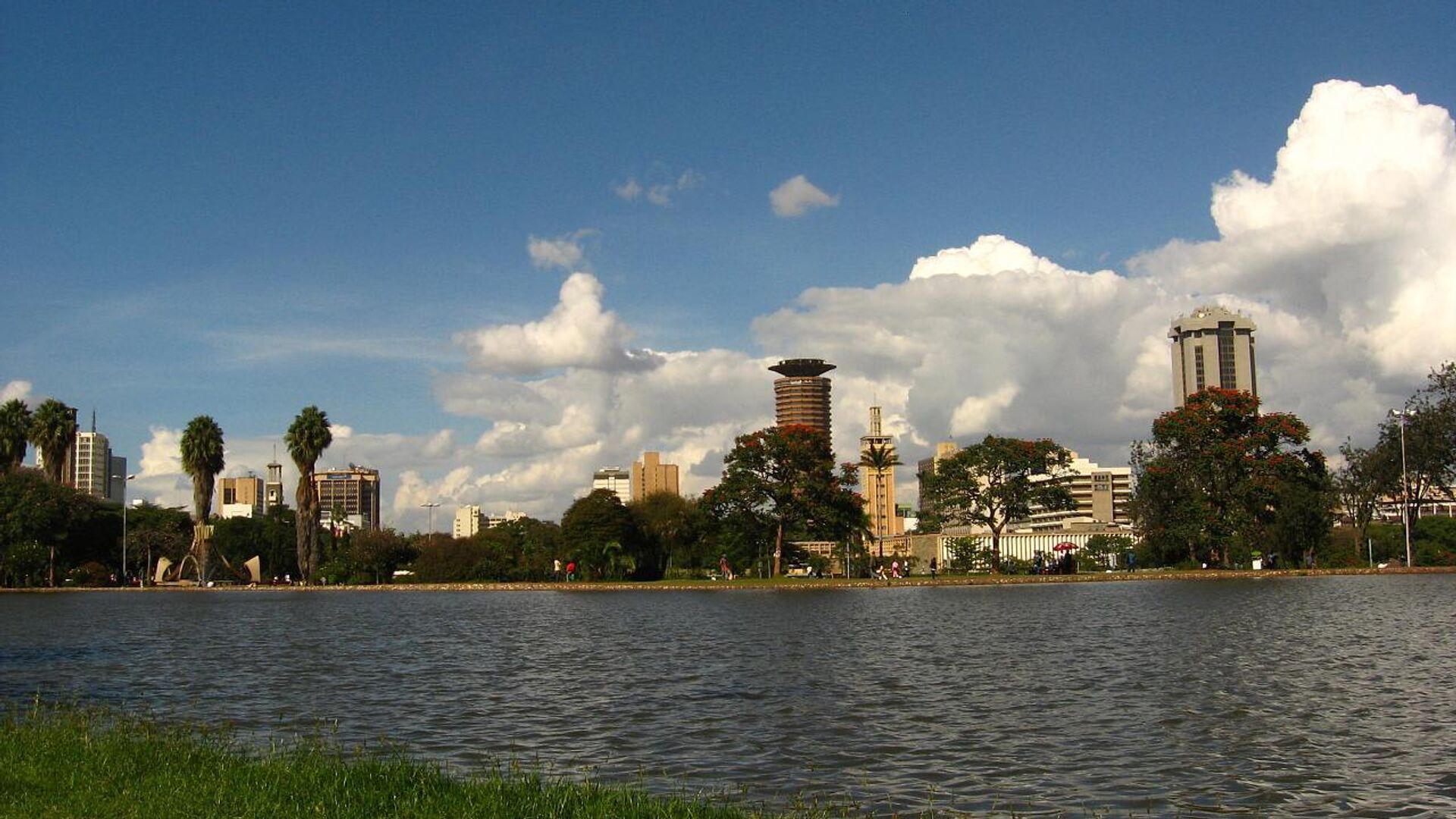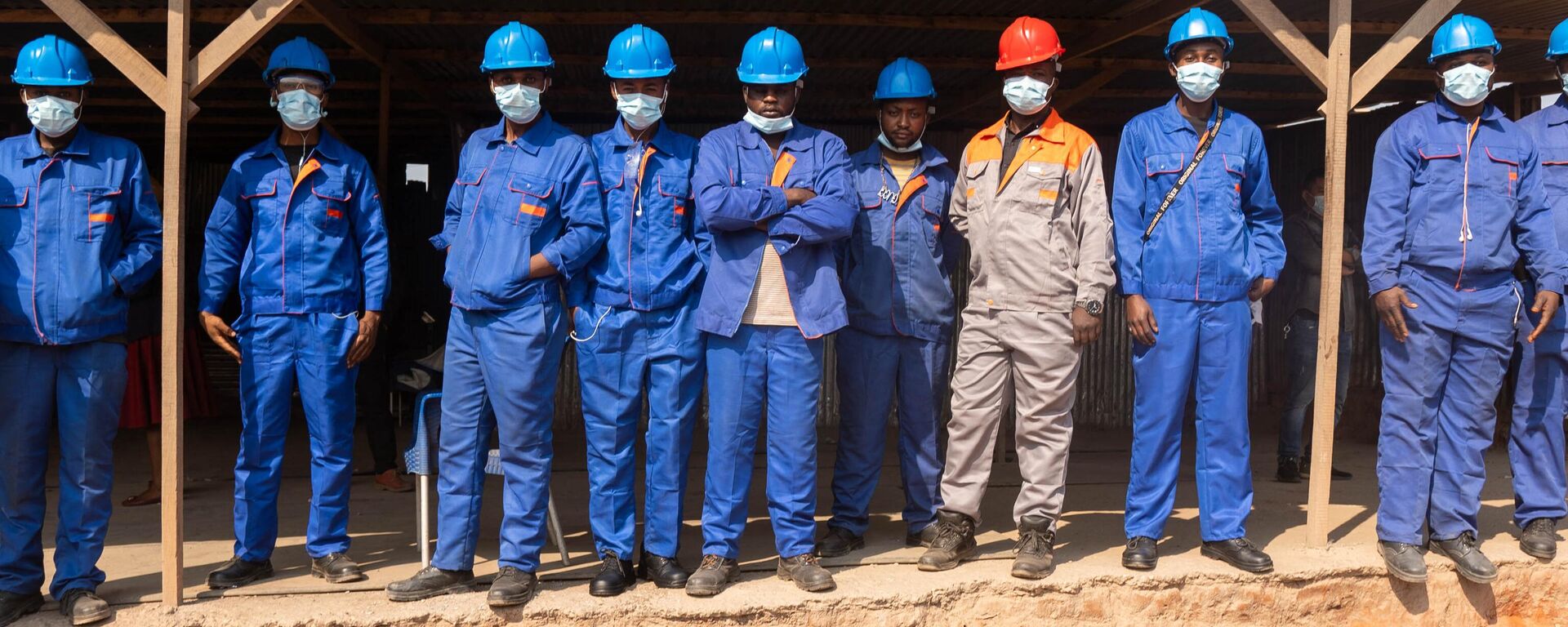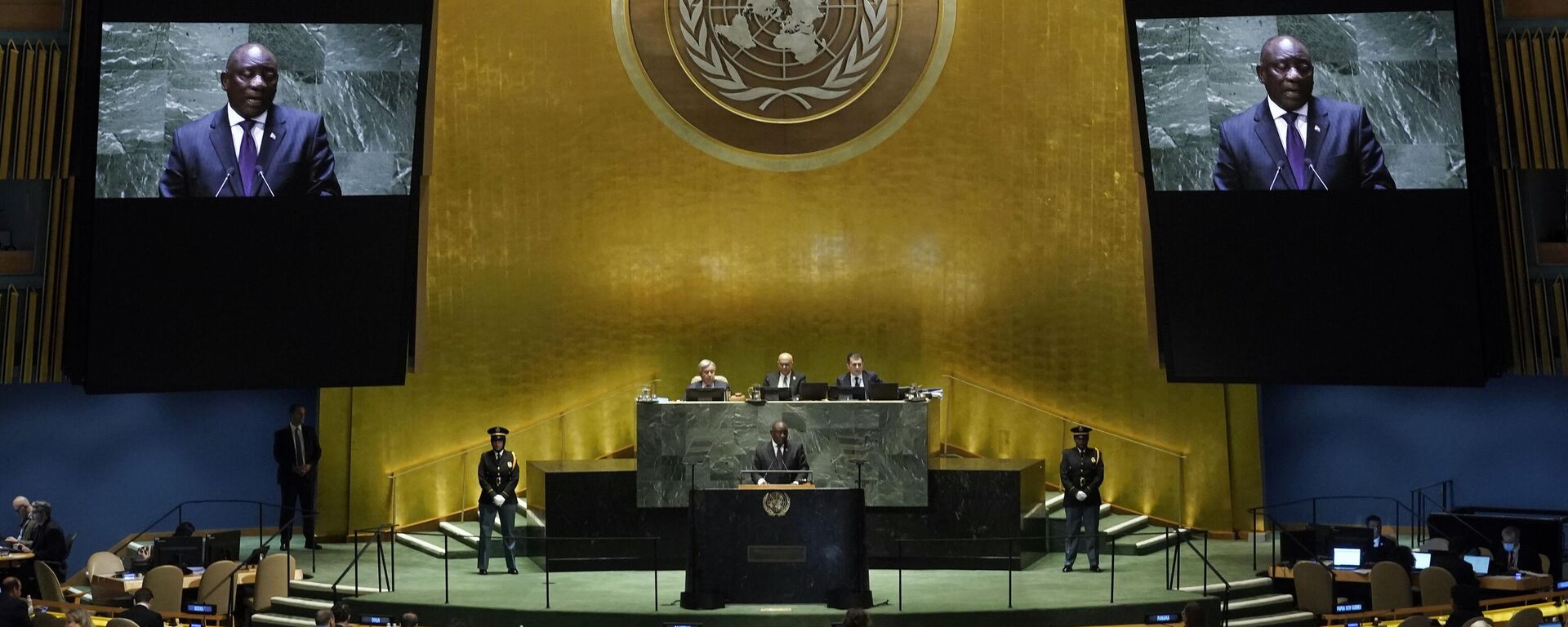https://en.sputniknews.africa/20230921/africa-believes-in-peaceful-co-existence-experts-on-international-day-of-peace-1062243265.html
'Africa Believes in Peaceful Co-Existence', Experts Say on International Peace Day
'Africa Believes in Peaceful Co-Existence', Experts Say on International Peace Day
Sputnik Africa
The world celebrates the annual International Day of Peace on Thursday, which was set up to diminish global violence and exalt the ideals of peace. This year's... 21.09.2023, Sputnik Africa
2023-09-21T12:21+0200
2023-09-21T12:21+0200
2023-09-22T07:27+0200
opinion
international
africa insight
russia
china
peace
terrorism
west
west africa
colonialism
https://cdn1.img.sputniknews.africa/img/07e7/09/15/1062256851_0:120:1280:840_1920x0_80_0_0_8cc97bcccf79654af6e897955e356e87.jpg
The processes of decolonization of Africa in the second half of the 20th century sparked violence, conflicts and civil wars on the continent, the echoes of which are still heard today. In addition, some regions of Africa now face the growing threat of Islamist extremists terrorizing local populations. In honor of the International Day of Peace, Sputnik Africa sat down with experts from the continent to discuss who is to blame for unleashing conflicts in the continent and what African nations should do to ensure peaceful skies over their heads.African countries believe in the possibility of a conflict-free existence and are morally entitled to talk about peaceful solutions as they have never interfered in the internal affairs of other continents, Dr. Chidochashe Nyere, a research fellow at the Institute for Pan-African Thought and Conversation in the University of Johannesburg, told Sputnik Africa.However, regarding conflicts on African soil, the pundit noted that not all of them have African roots, as "there is a lot of foreign intervention in Africa." According to Nyere, Western countries did not like the fact that the liberation movements of African nations fought them, as the West's goal was "to dominate in order to take over our minerals," an aim that remains today. Driven by their goals to seize the continent's resources, Western countries favor opposition parties and "exploit that gap where we fight each other politically," Nyere explained.The researcher likewise noted that African nations can resist this foreign interference through a greater degree of integration, which encompasses the creation of a single currency to "trade minerals on their own terms" and abandoning the American dollar, the formation of a single army and a single administrative center. The expert pointed out that the current "fragmentation" of African countries is a result of Western colonial policies.As for a single currency for the continent, the expert emphasized that it is necessary to move away from the US dollar, which continues to be "unwarranted force and unwarranted watchmen" in Africa's domains. The pundit added that the continent should finance itself independently, minimizing external influences.In this vein, Nyere said he is alarmed by the financial dependence of African countries on Western countries, which "have an agenda against us." The expert pointed out that African countries should look at Russia and China as partners instead of the West. According to him, Moscow and Beijing have never occupied African nations and "are always ready for partnership with the continent."Concerning the creation of a unified army, the expert said, this approach would improve the quality of the continent's armed forces, whose fragmentation today prevents African countries from defending themselves against foreign interference.Thus, in terms of military integration, the expert welcomed the creation of the Alliance of Sahel States, comprising Mali, Burkina Faso and Niger. He said that with the alliance, these countries have a better chance of stopping insurgency and terrorism in the Sahel region because they are able to track and control extremists.'Turbulent Times'Sustainable peace in an inclusive meaning is not only the absence of conflict, but also the presence of order, justice and law, Felix Chinwe Asogwa, a professor of international relations in at the Enugu State University of Science and Technology, explained to Sputnik Africa. In this vein, the expert noted that Africa has been going through a "very turbulent time," and sustainable peace has not yet come to the continent.The professor pointed out that the "preponderance of poverty" on the continent is to blame for Africa's continued lack of sustainable peace.Another problem driving instability on the continent that the expert cited is the leadership deficit in Africa. Using the example of relations between France and Niger, the researcher pointed out that Western countries impose on an African nation a leadership that will protect Western interests instead of African ones.According to the expert, the way out of resisting foreign interference for the continent lies in uniting nations in preparing "leaders accountable to those they are leading."In addition, the expert believes that African nations need to increase intra-continental economic cooperation in order to avoid financial dependence on Western countries. The danger of such dependency rests for Africa in the fact that external infusions cause nations to neglect the development of their political and economic institutions, Asogwa opined.Effective leadership in African countries, Asogwa underlined, should not only curtail the reliance of the continent's nations on the West, but also is "the number one measure" to minimize the threat of terrorism, which is "hampering" peace in Africa. Furthermore, to combat radicals, the continent needs to build "a strong platform to ensure or guarantee collective security measure," the researcher suggested.Finally, in order to achieve sustainable peace, the concept of security in African countries must address the protection of ordinary people, protecting them in the humanitarian sphere, the pundit believes.
https://en.sputniknews.africa/20230913/resource-curse-expert-on-wests-human-rights-abuses-linked-to-copper-mining-in-dr-congo-1062093736.html
https://en.sputniknews.africa/20230920/the-era-of-african-development-has-arrived-what-african-leaders-said-at-un-general-assembly-1062234859.html
russia
china
west
west africa
Sputnik Africa
feedback@sputniknews.com
+74956456601
MIA „Rossiya Segodnya“
2023
Maxim Grishenkin
https://cdn1.img.sputniknews.africa/img/07e7/0a/17/1063018107_0:0:1104:1103_100x100_80_0_0_03090c85a11f5d2e8a19cf1d989443c9.jpg
Maxim Grishenkin
https://cdn1.img.sputniknews.africa/img/07e7/0a/17/1063018107_0:0:1104:1103_100x100_80_0_0_03090c85a11f5d2e8a19cf1d989443c9.jpg
News
en_EN
Sputnik Africa
feedback@sputniknews.com
+74956456601
MIA „Rossiya Segodnya“
Sputnik Africa
feedback@sputniknews.com
+74956456601
MIA „Rossiya Segodnya“
Maxim Grishenkin
https://cdn1.img.sputniknews.africa/img/07e7/0a/17/1063018107_0:0:1104:1103_100x100_80_0_0_03090c85a11f5d2e8a19cf1d989443c9.jpg
international, africa insight, russia, china, peace, terrorism, west, west africa, colonialism, minerals, ditching dollar
international, africa insight, russia, china, peace, terrorism, west, west africa, colonialism, minerals, ditching dollar
'Africa Believes in Peaceful Co-Existence', Experts Say on International Peace Day
12:21 21.09.2023 (Updated: 07:27 22.09.2023) Longread
The world celebrates the annual International Day of Peace on Thursday, which was set up to diminish global violence and exalt the ideals of peace. This year's UN-led observance is themed "Actions for Peace: Our Ambition for the #GlobalGoals," calling for collective and individual efforts to forge peace.
The processes of decolonization of Africa in the second half of the 20th century sparked violence, conflicts and civil wars on the continent, the echoes of which are still heard today. In addition, some regions of Africa now face the growing threat of Islamist extremists terrorizing local populations.
In honor of the International Day of Peace, Sputnik Africa sat down with experts from the continent to discuss who is to blame for unleashing conflicts in the continent and what African nations should do to ensure peaceful skies over their heads.
African countries believe in the possibility of a conflict-free existence and are morally entitled to talk about peaceful solutions as they have never interfered in the internal affairs of other continents, Dr. Chidochashe Nyere, a research fellow at the Institute for Pan-African Thought and Conversation in the University of Johannesburg, told Sputnik Africa.
"So I just want to put that clearly because as Africans in all of Africa, we do believe in peaceful co-existence. Hence, I'm highlighting there's no history whatsoever of Africans leaving their own continent to go and cause havoc elsewhere," the expert said. "Africans are not in the business of attacking other countries or other continents."
However, regarding conflicts on African soil, the pundit noted that not all of them have African roots, as "there is a lot of
foreign intervention in Africa." According to Nyere, Western countries did not like the fact that the liberation movements of African nations fought them, as the West's goal was "to dominate in order to take over our minerals," an aim that remains today.
"They [Western countries] are guarding against their own interests and their interests are to exploit Africa in terms of Africa's mineral resources," the expert stressed.
Driven by their goals to seize the continent's resources, Western countries favor opposition parties and "exploit that gap where we fight each other politically," Nyere explained.
The researcher likewise noted that African nations can resist this foreign interference through a greater degree of integration, which encompasses the creation of a single currency to "trade minerals on their own terms" and abandoning the American dollar, the formation of a single army and a single administrative center.
The expert pointed out that the current "fragmentation" of African countries is a result of Western colonial policies.
"We are saying it's high time for Africa to identify itself as a unit. Africa is unitary. This fragmentation is not of our own making anyway. It is a European making in terms of what they did at the Berlin West Africa Conference in 1882-1885. But Africa was partitioned according to European whims. So unless we fundamentally deal with that problematic structure, we are barking up the wrong tree," Nyere remarked.
As for a single currency for the continent, the expert emphasized that it is necessary to
move away from the US dollar, which continues to be "unwarranted force and unwarranted watchmen" in Africa's domains. The pundit added that the continent should finance itself independently, minimizing external influences.
In this vein, Nyere said he is alarmed by the
financial dependence of African countries on Western countries, which "have an agenda against us." The expert pointed out that African countries should look at Russia and China as partners instead of the West. According to him, Moscow and Beijing have never occupied African nations and "are always ready for partnership with the continent."
Concerning the creation of a unified army, the expert said, this approach would improve the quality of the continent's armed forces, whose fragmentation today prevents African countries from defending themselves against foreign interference.
"Time and time again it has been proven, and this continues to happen, foreign interventions come and use us and pit us one against the other. And because of the fragmented nature, we tend to fall for that trip. However, going forward, if our militaries come together, if we have one military, one full military and one intelligence organization, it will be easy," Nyere pointed out.
Thus, in terms of military integration, the expert welcomed the creation of the Alliance of Sahel States, comprising Mali, Burkina Faso and Niger. He said that with the alliance, these countries have a better chance of stopping insurgency and terrorism in the Sahel region because they are able to track and control extremists.
Sustainable peace in an inclusive meaning is not only the absence of conflict, but also the presence of order, justice and law, Felix Chinwe Asogwa, a professor of international relations in at the Enugu State University of Science and Technology, explained to Sputnik Africa. In this vein, the expert noted that Africa has been going through a "very turbulent time," and sustainable peace has not yet come to the continent.
The professor pointed out that the "preponderance of poverty" on the continent is to blame for Africa's continued lack of sustainable peace.
"In Africa today, the prevailing level of poverty is so scarce, and for sure the level of poverty within the African continent cannot be a good environment for the sustenance of peace," Asogwa argued, adding that Africa is naturally endowed with human and natural resources that, if properly utilized, can catapult the continent into the most developed region of the world.
Another problem driving instability on the continent that the expert cited is the leadership deficit in Africa. Using the example of relations
between France and Niger, the researcher pointed out that Western countries
impose on an African nation a leadership that will protect Western interests instead of African ones.
"[The] French government has been able to use that to try to foist the kind of leaderships that are interested in protecting French interests rather than the interest of the indigenes of that country. And that is what is playing out in most of these African countries," Asogwa remarked.
According to the expert, the way out of resisting foreign interference for the continent lies in uniting nations in preparing "leaders accountable to those they are leading."
In addition, the expert believes that African nations need to
increase intra-continental economic cooperation in order to avoid financial dependence on Western countries. The danger of such dependency rests for Africa in the fact that external infusions cause nations to neglect the development of their political and economic institutions, Asogwa opined.
"It is important that Africans, especially they have true leaders, responsible leaders should begin to think, reflect essentially on how to increase intra African economic relations rather than depending on the economic relation between the Western powers and the African countries," the professor stressed.
Effective leadership in African countries, Asogwa underlined, should not only curtail the reliance of the continent's nations on the West, but also is "the number one measure" to minimize the
threat of terrorism, which is "hampering" peace in Africa.
Furthermore, to combat radicals, the continent needs to build "a strong platform to ensure or guarantee collective security measure," the researcher suggested.
"We need a stronger collective security measure to ensure that terrorism, when developed in one society collectively the other countries can unite and to stamp it out," Asogwa outlined.
Finally, in order to achieve sustainable peace, the concept of security in African countries must address the protection of ordinary people, protecting them in the humanitarian sphere, the pundit believes.
"There's a need for a paradigm shift in terms of the security architecture of most African countries, refocusing it on [...] human security ensuring that those that are governed, the generality of people also are secured in terms of their welfare needs, in terms of their health needs, in terms of their environmental needs and in terms of food needs," Asogwa concluded.




